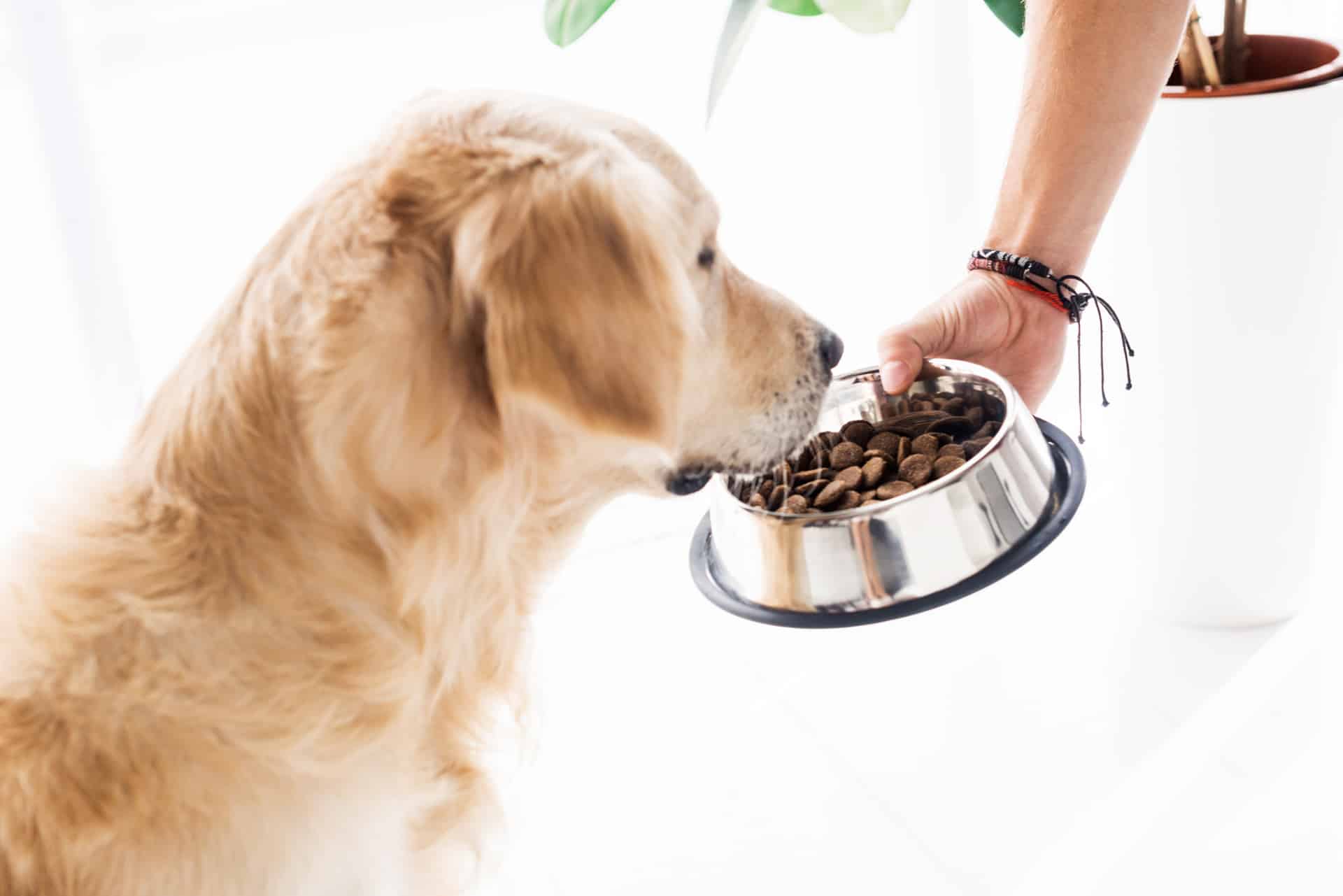A Dog Owner’s Guide to Understanding Nutrition
Gettin’ a grip on your pup’s dietary needs is key for their health and happiness. Here’s a guide to get you started with basic dog nutrition:
Necessary Nutrients:
Dogs gotta have six main nutrients to stay healthy, like protein, fats, carbs, vitamins, minerals and H2O. These nutrients give ’em energy, help ’em grow, protect ’em from disease and keep ’em in good shape.
Labels:
When choosin’ dog food, read the label and check the ingredients for quality and source. Avoid food with fillers, by-products and artificial preservatives.
Timetable:
Establishing a feedin’ schedule can help maintain your pup’s digestion, encourage them to eat when food’s around and prevent them from being overweight and obese.
Special Needs:
Dogs with health conditions may need special food. Talk to your vet to find out what type of food and nutrients your pup needs.
Pro Tip: Look at the ingredients before buyin’ dog food and go for quality food with meat as the first ingredient. Also, check with your vet before makin’ changes to your pup’s diet.
Understanding Your Dog’s Nutritional Needs
Give your pooch the best nutrition! It’s essential for dog owners to comprehend their fur baby’s dietary needs. Keeping them healthy and content is the goal. A nutritious diet can assist your pup in staying vibrant, sharp and active. Inadequate sustenance can lead to many health issues. This guide will explain the fundamentals of dog nutrition. We’ll describe the crucial nutrients your canine requires and how to provide them with the right nutrition.
The Basic Nutrients in Dog Food
It’s key to know the major nutrients in your pup’s chow. Here are the must-have ones:
- Protein: Necessary for making and fixing muscles, tissues, and organs. Chicken, beef, or fish are great sources.
- Carbs: Provide energy and whole grains like brown rice and oats are good picks.
- Fats: Give energy and help brain function. Fish oil and chicken fat are healthy sources.
- Vitamins: A, D, E, and K for vision, immune system, and bones. Look for food enriched with vitamins.
- Minerals: Calcium, phosphorous, and potassium for bones, teeth, nerves, and fluid balance. Make sure their food has enough of these minerals.
By knowing about these nutrients, you can give your pup a diet tailored to their needs.
The Importance of a Balanced Diet
A balanced diet is very important for keeping your pup healthy and energized. Nutrition plays a big role in keeping your pooch fit and preventing diseases. A balanced diet for your pup should include the right mix of macronutrients, vitamins, minerals, and water.
Here are some tips:
- Give your pup a good source of protein, like chicken, fish, or lamb. This will help with muscle repair and growth.
- Include complex carbs, like brown rice or sweet potato, to give energy.
- Include healthy fats, such as omega-3 and omega-6, to aid brain function and a shiny coat.
- Offer various fruits and veggies to give important vitamins, minerals, and fiber.
By giving your pup a balanced diet, you can help them have a long healthy life!
How to Determine Your Dog’s Nutritional Requirements
It’s essential to comprehend your pooch’s dietary needs to keep up their general wellbeing. Here’s the manner by which you can decide your doggie’s dietary necessities:
- Age: Dogs have various dietary prerequisites at various ages. Puppies and more established dogs, for instance, have different dietary needs than grown-up dogs.
- Action level: A profoundly dynamic dog will need more calories and protein than a latent one.
- Type and size: Big breed dogs have various dietary requirements than little breed dogs. For instance, huge dogs need more joint help while little dogs may need higher calorie substance and littler kibble size.
- Wellbeing condition: Certain medical problems, for example, corpulence, hypersensitivities or digestive issues require uncommon eating regimens to oversee them.
When you decide what your pooch’s dietary necessities are, you can pick fitting food and sums to take care of them. Giving your canine an adjusted eating routine is significant for ideal wellbeing.
Pro tip: Consult your vet before rolling out any major improvements to your pooch’s eating routine to ensure you are meeting all their dietary necessities.
Reading Dog Food Labels
Getting food for your pooch? Remember to check out the packaging labels! Knowing what goes in your dog’s food and the nutrients it provides for their health is super important. Let’s break down the key points to keep in mind when reading pet food labels.
Understanding Dog Food Ingredients
To ensure your pup’s proper nutrition, it is important to understand the ingredients in their food. When reading labels, keep these tips in mind:
- Look for whole food ingredients such as chicken, beef, or fish at the start of the list.
- Avoid by-products, fillers, artificial preservatives and flavours.
- Be wary of grain-based food, as some dogs may have difficulty digesting it.
- Check the balance of carbohydrates, protein and fat based on your pup’s age, weight and activity level.
- High-quality food may cost more up front, but it can save you money on vet bills in the long run.
By understanding the ingredients in your pup’s food, you can make good decisions for their health and wellbeing.
How to Identify Low-Quality Dog Food
As a pup parent, it’s key to be aware of the quality of grub you’re feeding your pooch. Here are some pointers for recognizing low-grade dog food by reading labels:
- Check the ingredient list. The first few should be high-quality protein sources (meat or meat meal). No fillers (corn, wheat or soy).
- Say no to artificial additives. Natural preservatives like tocopherols (Vitamin E source) are better than chemical preservatives like BHA, BHT, and ethoxyquin.
- Check the AAFCO statement. Look for dog food labelled “complete and balanced” by the Association of American Feed Control Officials (AAFCO).
- Don’t be fooled by marketing. Words like “premium”, “natural”, “grain-free”, or “holistic” aren’t regulated. Read the whole label to verify the claims.
By following these tips, you can make sure your pup is eating the best food possible. Pro tip: If you’re still uncertain, ask a vet or canine nutritionist for more details.
How to Choose the Right Dog Food for Your Dog
When selecting your pup’s chow, studying labels is key. Here are some hints for cracking dog food labels:
- Look for named meats (like chicken or beef) at the top.
- Avoid any that list “meat by-products” or “meat meal” as the main ingredient.
- Check the guaranteed analysis table for the min percent of crude protein and fat and max of crude fiber and moisture.
- Pick dog food that meets the nutritional standards set by AAFCO.
- Think about your dog’s special needs, like age, breed, size and dietary needs.
Pro Tip: If you’re unsure, ask your vet what’s best!
Types of Dog Food
Choosing the right food for your pup? Consider the types of food, nutrition, and ingredients!
Not all dog foods are the same. You have lots of options. Let’s look at the types of food, their nutrition, and if they’ll fit your pup’s needs.
Dry Dog Food
Dry dog food, otherwise called kibble, is a simple and pocket-friendly option for pet owners who want to give their furry mates a whole and healthy diet.
There are 3 kinds of dry dog food:
- Premium: It is made with top-quality ingredients and no fillers. It’s pricier but has better nutrition.
- Grocery store: This type uses lower-grade ingredients and often has fillers and artificial preservatives. It’s cheaper but not as nutritious as premium dry food.
- Prescription: It requires a vet’s approval and is meant to deal with health issues like allergies, digestion, or weight.
When picking dry dog food, think of your dog’s age, size, and activity level. Check if the label says it meets the standards of the Association of American Feed Control Officials (AAFCO) for whole and balanced nutrition. Pro tip: Talk to your vet before changing your pup’s diet.
Wet Dog Food
Wet dog food is a common type of pet food! It has high moisture content, which helps dogs stay hydrated and boosts their urinary tract health. Wet food is also easier to chew and swallow, which makes it great for dogs with dental issues or jaw pain.
There are four kinds of wet food available:
- Canned food – it’s the most common and comes in various flavors and textures.
- Tubs – similar to canned food, these come in clear plastic containers.
- Pouches – very convenient and easy to use, perfect for owners who are always on the go.
- Trays – good for portion control, and you can mix and match different flavors.
It’s important to select a top-notch wet food that suits your pup’s needs and tastes. Speak to your vet to make sure wet food is the right choice for your dog.
Raw Dog Food
Raw dog food is gaining in popularity with owners who think it is a more natural and healthy option for their pup. There are two main types: pre-made and homemade.
Pre-made, also known as commercial raw dog food, can come in forms like raw frozen patties, freeze-dried, and dehydrated meals.
Homemade raw food needs research and planning to make sure your pooch gets the right nutrients.
It is important to talk to a vet before trying raw food to make sure it’s safe and nutritionally balanced.
Pro Tip: Raw dog food may not be suitable for all pups, especially those with weaker immune systems. Always consult your vet before starting a new diet.
Feeding Your Dog
Responsible pet ownership means feeding your dog the correct food. Nutrition is essential for your pup’s health and happiness. Let’s learn the basics of canine nutrition and how to apply them. Make sure your pooch gets the nutrients they need to remain healthy and content. Let’s start!
How Often Should You Feed Your Dog?
Feeding your pup right is essential for their health. But how often? It all depends on their age, size, and activity level.
Puppers: Growing pups need more meals since their bodies are still developing. Give them 3-4 a day until they’re 6 months old.
Adult Dogs: When they reach 6 months, switch to two meals a day to keep them healthy.
Senior Dogs: Older doggos may eat less due to activity and metabolism, but may need more calories to maintain their weight. Ask your vet for the best schedule for your pup.
Avoid overfeeding! Keep portion sizes appropriate and contact your vet if you’re worried.
How Much Food Should You Give Your Dog?
Feeding your pup correctly is essential for their health. How much to give depends on age, size, breed, and activity level.
Here are some tips:
- Pups should have food 3-4 times daily till 6 months old.
- Adult dogs should have food once or twice daily based on their activity level.
- Use body condition score to determine amount. Feel but don’t see their ribs.
- Be accurate – measure food using cup.
- Don’t overfeed – it can lead to obesity and health problems.
- Think about individual needs and consult vet for best feeding schedule and amount.
How to Help Your Dog Maintain a Healthy Weight
It’s necessary to keep your pup’s weight healthy. Here are some tips to aid them:
- Know their ideal weight and watch it closely.
- Measure the food you give and stick to portion control.
- Choose high-quality food with lean proteins, complex carbs, and healthy fats.
- Treat your pet with moderation, using healthy snacks like carrots, apple pieces, or small chicken chunks.
- Include physical activity in their routine – like walking, playing, and training exercises.
- Finally, consult with a vet before changing their diet, activity, or health plan. A pro can give helpful advice specifically for your pup.
Nutritional Supplements for Dogs
Nutrition is key for a pup’s health. Supplements could help make sure your dog gets the vitamins and minerals they need. But which ones are good? What should you look for?
When selecting a supplement, there are many points to think about. In this guide, we’ll discuss the ups and downs of different types. We’ll also explore which ones might be best for your four-legged friend.
Common Nutritional Deficiencies in Dogs
Doggies might suffer from certain nutritional deficiencies. These can result in bad health and illnesses. Let’s take a look at the most typical ones and how supplements can be the answer!
- Protein: If a pup’s diet has not enough protein, they may experience slow growth, wasting of muscles, and a weakened immune system.
- Vitamins: Not getting enough of Vitamin A, D, and E can affect their sight, bone development, and reproductive health.
- Minerals: Calcium, iodine, and iron are essential, and if deficient, can cause skin problems and anemia.
Nutritional supplements such as multivitamins, fish oil, and probiotics can help fill the nutritional gaps and improve overall wellness. But remember to consult a vet first before giving any supplements, as too much can have bad side effects.
Tip: To avoid deficiencies, always check the nutritional value of your pup’s food and strive for a balanced diet.
Types of Nutritional Supplements for Dogs
Dog owners must understand their pup’s individual needs and talk to a vet before giving any supplements. Don’t forget: supplements alone won’t give proper nutrition. A balanced diet is key to health. Here are five common types of supplements:
- Multivitamins: A mix of essential vitamins and minerals to support your pup’s health.
- Probiotics: Beneficial bacteria to regulate digestion and strengthen the immune system.
- Omega-3 Fatty Acids: For joint, heart, and brain health, plus a shiny coat.
- Glucosamine and Chondroitin: To ease arthritis pain and improve joint mobility.
- Antioxidants: Protect cells from free radical damage and prevent diseases.
How to Choose the Right Nutritional Supplements for Your Dog
Picking the right dietary supplements for your beloved pet can be hard, especially with so many options in the market. Here are some hints to help you make a wise choice:
- Think about your pup’s particular health and dietary needs. Is your pup feeling joint pain, allergies, or digestion issues? Look for supplements that focus on these special problems.
- Check the quality of the supplements. It’s important to select supplements made with high-quality, natural ingredients that are free from chemicals and additives.
- Look for supplements that have been tested and authorized by reliable organizations like the National Animal Supplement Council (NASC).
- Notice the dosage instructions and stick to them exactly to avoid potential problems.
- Chat with your vet to talk about your pet’s health and special needs before giving them any new supplements.
By following these tips, you can make sure that your darling pet gets the right supplements to boost their general health and well-being.
Frequently Asked Questions
1. What are the essential nutrients that dogs need in their diet?
Dogs need a balanced amount of protein, fats, carbohydrates, vitamins, and minerals for their overall health and well-being.
2. How much should I feed my dog?
The amount of food a dog needs depends on factors such as age, breed, size, and activity level. Consult with your veterinarian to determine the appropriate amount of food for your dog.
3. Can I give my dog table scraps?
While some human foods are safe for dogs, many are harmful and can cause digestive problems. Limit table scraps and only give your dog food specifically made for them.
4. Should I choose wet food or dry food for my dog?
Both wet and dry food are good sources of nutrition, but dry food can help keep your dog’s teeth clean. Consult with your veterinarian to determine which type of food is best for your dog.
5. Why is it important to read the ingredients in my dog’s food?
Reading the ingredients on your dog’s food can help you determine if the brand is high-quality and has ingredients that are beneficial to your dog’s health. Look for ingredients such as whole meats and vegetables.
6. Can my dog have allergies to certain types of food?
Yes, dogs can have allergies to certain types of food just like humans. Common allergens include beef, dairy, and grains. Consult with your veterinarian if you suspect your dog has a food allergy.







